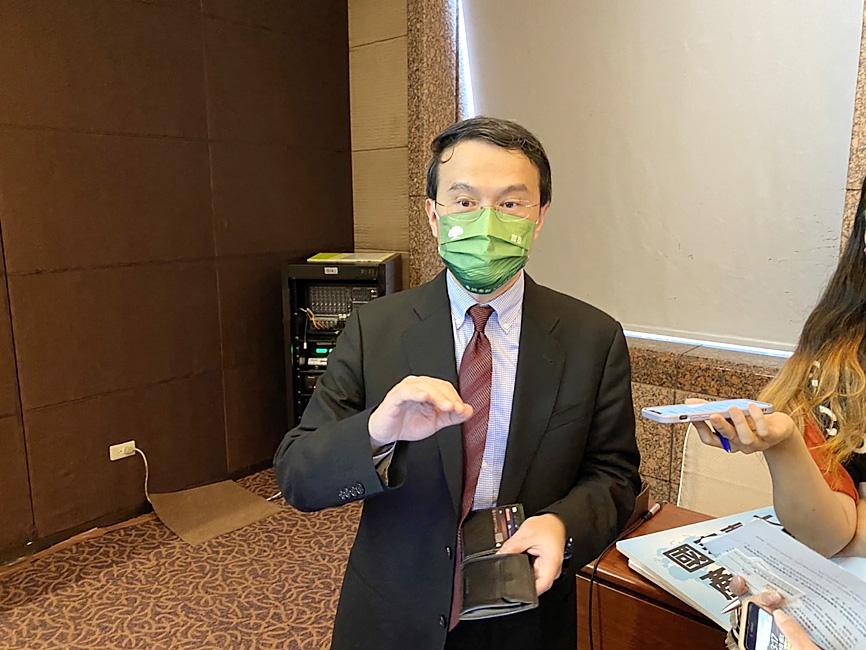Cathay Financial Holding Co (國泰金控) has revised downward its forecast for local economic growth from 3.9 percent to 3.7 percent, as the Ukraine war has caused food and metal prices to rise, worsened inflation and dampened global demand, it told a news conference in Taipei yesterday.
It is the first time the financial conglomerate has lowered its forecast for this year — it predicted an annual GDP growth of 3.5 percent in September last year and raised the figure to 3.9 percent in December, Cathay Financial data showed.
“The Ukraine war is the main reason for our revision. Although Russia and Ukraine account for less than 2 percent of global GDP, they are key suppliers of wheat, metal and energy, and the war in Ukraine has driven up prices of oil, food and metals,” said National Central University economics professor Hsu Chih-chiang (徐之強), who heads a research team commissioned by Cathay Financial.

Photo: Allen Wu, Taipei Times
“These price increases will worsen inflation in the US, which was already high before the outbreak of the war. Serious inflation might lead to lower consumption and even to economic recession,” Hsu said, adding that the US Federal Reserve cut its GDP growth estimate to only 2.8 percent.
There is a strong correlation between the US and Taiwanese economies, as the US is an important economic partner, Hsu said, adding that Cathay’s research has shown that a drop of 1 percentage point in US economic growth correlates to a dip of 0.5 percentage points in Taiwan’s economy.
Although exports and investment this year are expected to maintain their momentum, they are unlikely to show a robust rise year-on-year because of a high comparison base last year, Hsu said, adding that private consumption is likely to be the main driver of local economic growth this year.
“High inflation in Taiwan might curb private consumption, but we still estimate good annual growth” in consumption, Hsu said, adding that spending weakened during a local COVID-19 outbreak last year.
Whether the central bank is to raise the benchmark interest rate again in June depends on local inflation, Hsu said.
The consumer price index in the first two months of the year rose 2.6 percent annually, and “if its growth surpasses 3 percent from March to May, there is an 80 percent chance that the central bank will raise the rate again,” Hsu said.
The government has other tools for controlling inflation, such as freezing electricity or transportation costs, and all of the tools are likely to be tried before the central bank hikes rates again, Hsu said.
The central bank would not necessarily raise the rate multiple times, as Taiwan’s inflation rate is much lower than in the US, he added.

GROWING OWINGS: While Luxembourg and China swapped the top three spots, the US continued to be the largest exposure for Taiwan for the 41st consecutive quarter The US remained the largest debtor nation to Taiwan’s banking sector for the 41st consecutive quarter at the end of September, after local banks’ exposure to the US market rose more than 2 percent from three months earlier, the central bank said. Exposure to the US increased to US$198.896 billion, up US$4.026 billion, or 2.07 percent, from US$194.87 billion in the previous quarter, data released by the central bank showed on Friday. Of the increase, about US$1.4 billion came from banks’ investments in securitized products and interbank loans in the US, while another US$2.6 billion stemmed from trust assets, including mutual funds,

AI TALENT: No financial details were released about the deal, in which top Groq executives, including its CEO, would join Nvidia to help advance the technology Nvidia Corp has agreed to a licensing deal with artificial intelligence (AI) start-up Groq, furthering its investments in companies connected to the AI boom and gaining the right to add a new type of technology to its products. The world’s largest publicly traded company has paid for the right to use Groq’s technology and is to integrate its chip design into future products. Some of the start-up’s executives are leaving to join Nvidia to help with that effort, the companies said. Groq would continue as an independent company with a new chief executive, it said on Wednesday in a post on its Web

Even as the US is embarked on a bitter rivalry with China over the deployment of artificial intelligence (AI), Chinese technology is quietly making inroads into the US market. Despite considerable geopolitical tensions, Chinese open-source AI models are winning over a growing number of programmers and companies in the US. These are different from the closed generative AI models that have become household names — ChatGPT-maker OpenAI or Google’s Gemini — whose inner workings are fiercely protected. In contrast, “open” models offered by many Chinese rivals, from Alibaba (阿里巴巴) to DeepSeek (深度求索), allow programmers to customize parts of the software to suit their

JOINT EFFORTS: MediaTek would partner with Denso to develop custom chips to support the car-part specialist company’s driver-assist systems in an expanding market MediaTek Inc (聯發科), the world’s largest mobile phone chip designer, yesterday said it is working closely with Japan’s Denso Corp to build a custom automotive system-on-chip (SoC) solution tailored for advanced driver-assistance systems and cockpit systems, adding another customer to its new application-specific IC (ASIC) business. This effort merges Denso’s automotive-grade safety expertise and deep vehicle integration with MediaTek’s technologies cultivated through the development of Media- Tek’s Dimensity AX, leveraging efficient, high-performance SoCs and artificial intelligence (AI) capabilities to offer a scalable, production-ready platform for next-generation driver assistance, the company said in a statement yesterday. “Through this collaboration, we are bringing two